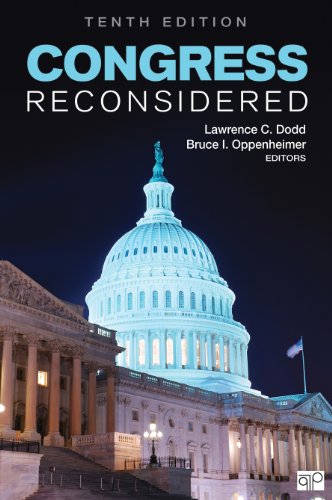Since its first edition, Congress Reconsidered was designed to make available the best contemporary work from leading congressional scholars in a form that is both challenging and accessible to undergraduates. For almost four decades, Dodd and Oppenheimer have delivered on this goal. With their tenth edition, this tradition continues, but with the benefit of contributing authors now able to focus on how various aspects of Congress have changed over time. Gary Jacobson not only analyzes congressional elections in the present day, but looks at changes that have occurred in elections since the 1970s. James Thurber places today′s struggles over the budget in the context of budget politics since the passage of the Budget and Impoundment Control Act. John Aldrich, Brittany Perry, and David Rohde trace the evolution of the House′s most influential committees, while Kathryn Pearson examines the growth (in number and influence) of women members of Congress. Simply put, this volume remains on the cutting edge with key insights into the workings of Congress.
Lawrence C. Dodd holds the Manning J. Dauer Eminent Scholar Chair in Political Science at the University of Florida. His books include Coalitions in Parliamentary Government (1976), Congress and the Administrative State (coauthored with Richard Schott, 1979), The Dynamics of American Politics (coedited with Cal Jillson, 1994), Learning Democracy (coauthored with Leslie E. Anderson, 2005), and Thinking About Congress (2012). His articles have appeared in the American Political Science Review, Journal of Politics, Polity, Journal of Democracy, and elsewhere. Dodd has served as a congressional fellow, Hoover national fellow, and Woodrow Wilson Center fellow; president of the Southern and Southwestern Political Science Associations; and chair of the APSA’s Legislative Studies Section.
Bruce I. Oppenheimer is professor of political science at Vanderbilt University and director of the Center for the Study of Democratic Institutions. He has been a Brookings fellow in Governmental Studies (1970–1971) and an APSA congressional fellow (1974–1975). He is author of Oil and the Congressional Process: The Limits of Symbolic Politics (1974). His book Sizing Up the Senate: The Unequal Consequences of Equal Representation (1999), cowritten with Frances Lee, was awarded the Lyndon Baines Johnson Foundation’s D. B. Hardeman Prize for the best book on Congress. He is also the editor of U.S. Senate Exceptionalism (2002) and the author of numerous articles. His recent research focuses on Congress and energy policy and on variation in competition in open-seat House primaries.
